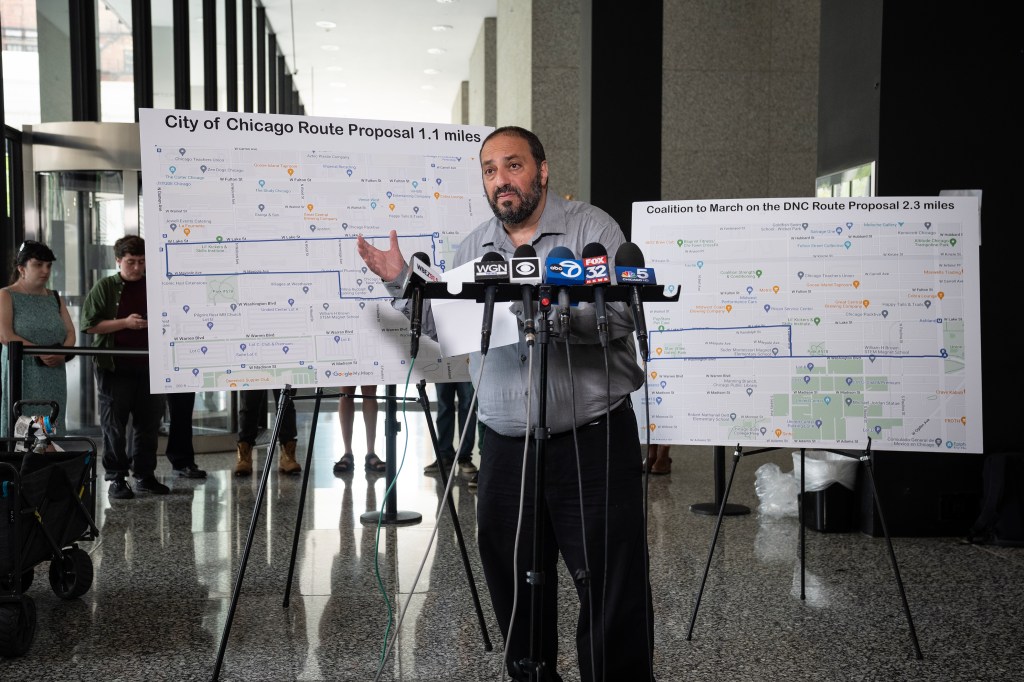With the Democratic National Convention just two weeks away, Chicago officials and groups planning protests around the event continue to squabble over where demonstrations will take place.
Several pro-Palestinian groups who together sued the city in March in an effort to secure protest routes within “sight and sound” of the convention were in court again Monday to demand a more direct and longer route along Washington Boulevard for their “March on the DNC.” Their attorney, Chris Williams, said they were “blindsided” by the possibility that they might not be able to hold speeches in a park two blocks north of the United Center.
Williams vowed to keep fighting for a plan for marches and speeches he argued would be safer than what the city has proposed and better align with his clients’ First Amendment rights.
“The way the city is doing this is take-it-or-leave-it, ‘you do what we say,’” Williams told U.S. District Judge Andrea Wood. “It’s not enough to say, ‘You have a route, you’re going to live with it.’ You’re going to have chaos.”
After a two-hour hearing and with neither side showing any intention of making further concessions, Wood said she planned to share a ruling “as soon as possible,” indicating a decision on the protest’s logistics may come in the next week.
Separately, a group that wants to protest in support of Israel during the convention said it is unsure of the status of its planned rally. Aya Shechter, chief programming officer with the Israeli American Council, said in an interview that her group wants demonstrators to be allowed to send the message, “We stand with Israel,” in light of what she described as anti-Israel protests around the country in light of the war in Gaza.
“We think that it is important that we have the same access to express our First Amendment rights and say what we want to say as well,” Shechter said. “It is important for us that Israel is not a partisan issue.”
The Israeli American Council’s application to hold a demonstration on the last day of the convention, the same day two pro-Palestinian groups plan to hold marches, was initially rejected by the city, a decision in line with the response to other protest groups that have requested the right to protest.
The city countered by offering the group a three-hour evening rally on the same day, Aug. 22, at Park 578, the closest city park to the United Center. But Shechter said in late July that the group was struggling to get in contact with city officials and was frustrated by a permitting process she said was difficult to navigate.
On Monday, she said her group was still trying to get in contact with the city and will share details about its rally when a permit is issued.
In court on Monday, Williams asked that the four groups he represents — the U.S. Palestinian Community Network, Chicago Alliance Against Racist and Political Repression, the Anti-War Committee and Students for a Democratic Society at UIC — also be allowed to rally in Park 578.
City attorneys had previously signaled they would allow the groups to use a stage at the park for speeches, Williams said in court. But those plans were put into question last week when the city announced a new permitting process for rallies in the park, he said.
City attorney Andrew Worseck told the judge that Chicago authorities never agreed to permit the rally in the park and had only previously discussed “tentative positions, tentative thinking.”
“We did not make promises that there would be stages in any park. We did not make promises that there would be port-a-potties in any park,” he said. “This is just a blatant misrepresentation of those talks.”
Worseck argued the protesters’ bid to march along Washington Boulevard through an intersection that is set to be blocked by a security checkpoint is “not workable.” Williams countered that moving the march route onto side streets would cause a “logjam” and lead to potentially dangerous confrontations between protesters and police.
The city has tried to negotiate a fair route that balances First Amendment rights with security concerns and traffic disruptions, Worseck said, citing a confidential conference between the two sides and changes from the initial route proposed by the city.
“We are now two weeks away from the convention. The city is entitled to put down its pen,” he said.
But Williams told the judge that the city has unfairly pushed back against compromises at every step after rejecting protesters’ initial applications, when it offered a two-block route through Grant Park, far away from the convention’s hotspots.
He predicted the pro-Palestinian protest scheduled for the first day of the convention could draw as many as 25,000 people.
While Wood said she would share a ruling on the protesters’ requests soon, she declined to block the city’s new permitting process for demonstrations at Park 578.
Originally Published:
